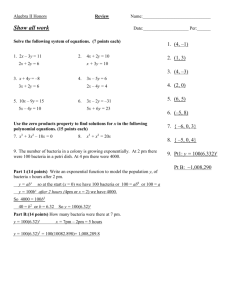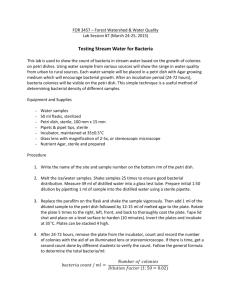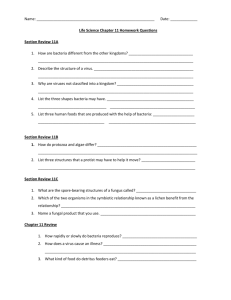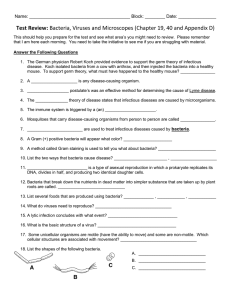enamel - Indigenious
advertisement
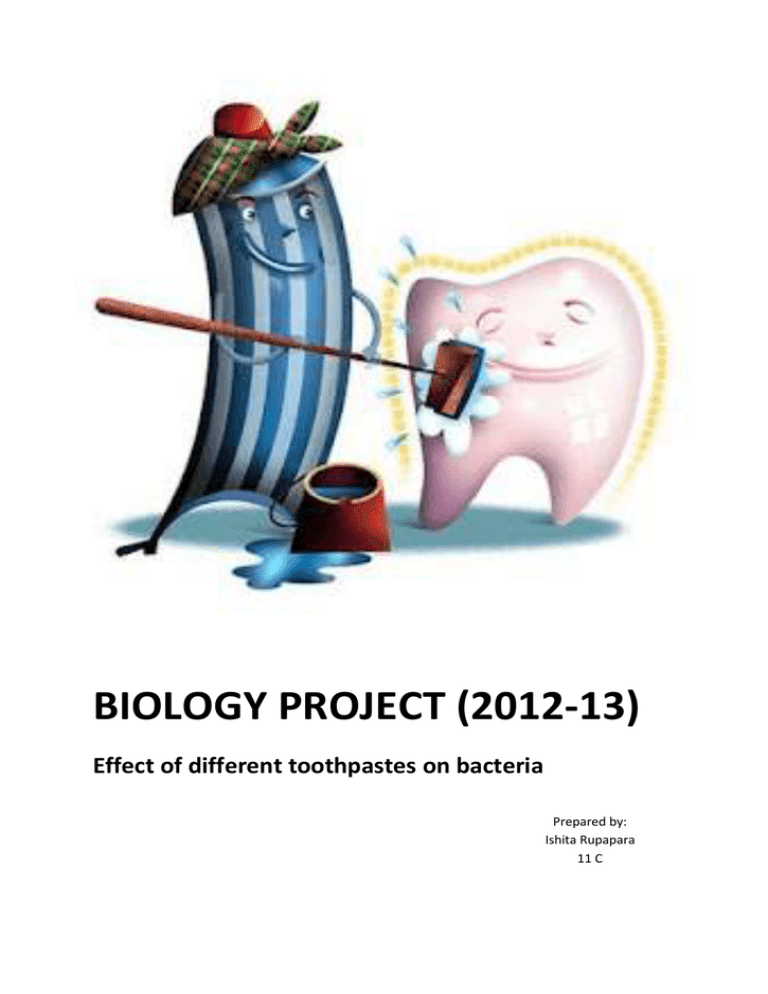
BIOLOGY PROJECT (2012-13) Effect of different toothpastes on bacteria Prepared by: Ishita Rupapara 11 C S. N. Kansagra School Biology Department CERTIFICATE PAGE A PROJECT REPORT ON – Effect of different toothpastes on bacterial growth. PROJECT SUBMITTED FOR FULFILLING THE REQUIREMENTS OF GROUP PROJECT FOR THE CCE EVALUATION, ISC YEAR I (2012-13) PROJECT PERFORMED BYKinnari Ashar and Ishita Rupapara PROJECT SUBMITTED BYIshita Rupapara _____________________ TEACHER _____________________ PRINCIPAL Index Introduction Hypothesis Variables Materials used Procedure Precautions Raw data Data presentation Graphs Conclusions Evaluations Limitations of experiment Suggestion for improvement Bibliography Remarks Introduction Toothpaste is a paste or gel dentifrice used with toothbrush. Toothpaste helps to remove plaque, a sticky, harmful film of bacteria that grows on teeth that causes gum disease and eventual tooth loss if not controlled. Toothpaste contains fluoride, which makes the entire tooth structure more resistant to decay and promotes remineralisation, which aids in repairing early decay before the damage can even be seen. Special ingredients in the dentifrice help to clean and polish the teeth and remove stains over time. Ordinary toothpaste may only contain sodium fluoride as an active ingredient; tartar control toothpaste may also contain triclosan. Triclosan is an antibacterial and antifungal organic compound found in many antibacterial soaps, deodorants, toothpastes, acne medications, and other antibacterial applications. Bacteria reside in great numbers in many places, both inside and on the surface of the human body. In many cases, like in the gut, the presence of bacteria is beneficial. Bacteria in the mouth cause the formation of cavities, and can increase the chance of other disease and illness. Many different types of bacteria live in the mouth, and some types simply pass through depending on the types of food consumed. Dental hygiene There are plenty of bacteria and other micro-organisms living in our mouth. These bacteria attack the food leftovers that stick to, and in between our teeth. They cause our teeth to decay, forming plaque and causing bad breath. When they digest sugar and starch that stick to our teeth, they produce acids that will dissolve tooth enamel. Brushing our teeth everyday with toothpaste is very important for dental hygiene. Using toothpaste together with the proper brushing techniques can help in getting rid of plaque and also remove bacteria so that gum disease and loss of teeth can be prevented. Some types of toothpaste are even able to prevent bacteria growth and plaque formation. The most important ingredient in toothpaste is fluoride. It helps in strengthening the tooth surface and prevents bacteria growth. It also helps to repair tooth decay in the early stages. Another ingredient in toothpaste that helps in fighting bacteria is Triclosan, an antibacterial agent. Bacteria in our Mouth There are various types of bacteria in our mouth, harmful and helpful. These types of bacteria include: Streptococcus Staphylococcus Neisseria Haemophilus Streptococcus pneumoniae Porphyromonas gingivalis Diphtheriod Fusobacteria Streptococcus mutans Hypothesis My hypothesis was that Colgate Total would reduce the amount of bacteria most. I based my hypothesis on the fact that Colgate Total has the ingredient Triclosan which is a strong antibacterial/antimicrobial agent. Variables Controlled variables: Size of pit Amount of toothpaste Incubation time Temperature of incubator Media Independent variable: Different types of toothpastes Dependent variable: Zone of inhibition of bacteria Materials used 5 different toothpastes Colgate Pepsodent Sensodyne Optifresh Glister 2gm Agar Agar 5.6gm Nutrient Agar 10ml Nutrient Broth solution 10-15 sterile test tubes with cap 2-3 sterile sugar tubes with cap 2 burners Sterile cotton swabs Sterile pipette nibs 100µl micropipette 2 conical flasks Sterile distilled water Autoclave Incubator (having constant temperature of 37°C) 2 Nichrome loops Methanol Glass spreader Weighing machine Borer Different types of toothpastes Petri dish showing bacterial growth and zone of inhibition Procedure Take 200ml of distilled water in conical flask and add 5.6gm Nutrient Agar and 2gm Agar Agar to it. Make a solution by stirring it till both the contents are completely dissolved. Take 10ml distilled water and a pinch of Nutrient Broth in a test tube and make its solution. Plug the flask with cotton swabs and newspaper on it and the test tube containing Nutrient Broth with a cap. Cover all the Petri dishes and the beaker containing pipette nibs with the newspaper. Also cover all test tubes and sugar tubes with cap. Put all the covered Petri dishes, beaker containing nibs, test tubes, sugar tubes and the two flasks in an autoclave for sterilization. After cooling, pour 20ml (approximate) of solution from flask in each Petri dish. Allow the solution in Petri dish to solidify. Select a prominent germy area and swab that area with the help of cotton. Slightly rub the cotton swab over the prepared N-Agar plate and cover the Petri dish. Put the Petri dish in incubator having constant temperature of 37 °C for a day or two to allow the bacterial growth. Isolate an individual colony from the mixture of different colonies obtained in the Petri dish with the help of loop. Put the loop having an isolated individual colony in a test tube which contains Nutrient Broth. Place the test tube in incubator to allow the bacteria to grow for few hours. Pour the solution from the test tube in each of the remaining 6 Petri dishes and spread it over the prepared N-Agar plates with the help of spreader. Mark 3 parts on each of the 6 Petri dishes. With the help of a borer, make a pit which is equidistant from each other and the walls of the Petri dish. Make a solution of each toothpaste by taking 1gm of toothpaste in 2ml distilled water. Pour 100µl of 5 different toothpaste solutions in 5 different pits with the help of micropipette. In first Petri dish 3 different toothpastes are taken i.e. Glister, Sensodyne and Optifresh where as in second Petri dish Pepsodent and Colgate are taken in 2 pits and third pit is filled with sterile distilled water which acts as a control. Two more sets are prepared and three such trials are done. All the Petri dishes are kept in incubator (37°C constant temperature) to allow the growth of bacteria for 1-2 days. The Petri dishes are removed from incubator and the zone of inhibition of bacteria is observed and measured with the help of scale. All the 5 toothpastes are compared by taking the average obtained from each of the three trials. Precautions After sterilizing, mostly the experiment is performed between the two burners so that the area around the burners is sterile. After spreading the N-Broth (having bacteria) with the help of spreader, the spreader is dipped in methanol and passed from flame to any possible bacteria stuck to the spreader. The nichrome loop is also burnt and so that it is not infected by bacteria and cooled so that high temperatures doesn’t kill the bacteria that are to be taken in the loop. Hands should be washed with dettol to make them free of bacteria and germs. While performing the experiment near the burners , care should be taken that it is performed safely. Raw data Sr.no. 1 2 3 4 5 toothpastes Colgate Pepsodent Sensodyne Glister Optifresh trail 1 2.5 2.3 3.5 3.0 1.5 trial 2 3.5 3.0 2.0 3.1 2.3 trial 3 3.1 2.6 1.8 2.0 2.6 Data presentation Sr.no. toothpastes trail 1 trial 2 trial 3 mean maxmean mean- standard min deviation 1 Colgate 2.5 3.5 3.1 3.03 0.47 0.53 2 Pepsodent 2.3 3 2.6 2.63 0.37 0.33 3 Sensodyne 3.5 2 1.8 2.43 1.07 0.63 3 3.1 2 2.7 0.4 0.7 1.5 2.3 2.6 2.1 0.5 0.6 4 Glister 5 Optifresh 0.34361315 A bar chart showing effect of different toothpastes on bacteria Error bar shows the range 4 zone of inhibition [in cms(+/-1mm)] 3.5 3 colgate pepsodent 2.5 sensodyne 2 glister optifresh 1.5 1 0.5 0 colgate 4 pepsodent sensodyne glister toothpastes optifresh A bar chart comparing the effect of different toothpastes on bacteria Error bar shows Standard Deviation zone of inhibition [in cms(+/-1mm)] 3.5 3 colgate pepsodent 2.5 sensodyne 2 glister optifresh 1.5 1 0.5 0 colgate pepsodent sensodyne glister toothpastes optifresh Conclusion Some bacteria cause diseases and other infection. The bacteria that cause sickness are harmful to human health. Most bacteria in the mouth are bad and eat away at teeth, causing tooth decay. Toothpaste, floss and various other items are used to reduce the amount of bacteria I human mouth. Toothpaste that effectively reduces bacteria should contribute to dental health. Thus from the experiment performed and results obtained we conclude that Colgate has the best effect on bacterial growth out of the 5 toothpastes that wee taken. Evaluation According to my hypothesis, Colgate would affect the bacterial growth the most. The results obtained from the experiment performed, I conclude that Colgate is the most effective toothpaste on bacterial growth. The media that was poured in the Petri dishes was poured on an average and was not measured accurately. The toothpaste solution though taken in micropipette might not have been accurately taken. Due the constant temperature of incubator, the bacterial growth in all Petri dishes was even. By providing enough Nutrient Broth, the bacteria were able to grow properly. Amount of toothpaste solution was enough to have its effect around the pit. Limitations of experiment The time to perform the experiment was less due to which the experiment was only performed once and the results obtained were not precise. The trials done were less due to which there was difference in the result. Suggestion for improvement The experiment performed can be improved by taking care of following steps: The solution poured in Petri dish should be poured after measuring and not poured approximately. The trials performed should be more so that the zone of bacterial inhibition obtained is more precise. The zone of bacterial inhibition should be measured with a more precise scale instead of a daily used ruler. The transferring of solution should be done in minimum time possible so that he Petri dish that is opened is not infected with bacteria. Bibliography http://www.sciencebuddies.org/science-fairprojects/project_ideas/MicroBio_Agar.shtml http://www.cliffsnotes.com/study_guide/MicrobialCultivation.topicArticleId-8524,articleId-8424.html http://www.google.co.in/imgres?num=10&hl=en&sa=X&biw=1272&bih =627&tbs=itp:clipart&tbm=isch&tbnid=4825LOK4IuSbvM:&imgrefurl=ht tp://chemlifemalavish.blogspot.com/&imgurl=http://3.bp.blogspot.com/_t7Ijf45rR3s/ Sm8chhvDSNI/AAAAAAAAAAc/tdwzDkhrh8/s320/toothpaste.jpg&w=274&h=320&ei=NEAUI7mDsS3rAeHioDYCw&zoom=1&iact=hc&vpx=1014&vpy=188&dur=99 5&hovh=243&hovw=208&tx=103&ty=115&sig=11322561579418195481 2&page=1&tbnh=105&tbnw=98&start=0&ndsp=24&ved=1t:429,r:7,s:0,i: 97 http://www.livestrong.com/article/161300-what-are-the-differenttypes-of-bacteria-found-in-the-human-mouth/ http://jac.oxfordjournals.org/content/45/2/153.full http://www.selah.k12.wa.us/soar/sciproj2006/RainanV.html http://www.colgateprofessional.co.uk/products/Colgate-TotalToothpaste/details http://www.sciencedaily.com/releases/2010/04/100413121334.htm http://www.all-science-fair-projects.com/print_project_1294_104 http://sandwalk.blogspot.in/2009/03/bacteria-in-your-mouth.html Remarks
